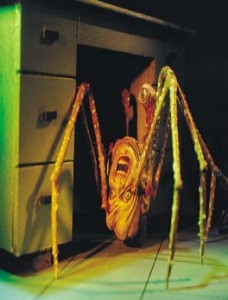Response to “Blame Shifting”
In continuation of AngryMurmurs’ post, “Blame Shifting,” I wanted to apply some of her ideas to Peter Watts, “The Things.” Unlike “Who Goes There?” and the film version, the fault in this story lies with mankind’s unwillingness to adapt and change, (on on an even grander scale, ‘the world’), not specifically just Americans or Norwegians. This seems to respond to John Campbell’s original short story – Watts suggests that opposition to change leads to destruction.
While reading this story, the Thing is far more superior than the movie or original story would have us believe. It’s not just an alien; it was “the very hand by which Creation perfects itself. In response to trying to ‘fix’ and make the form of mankind more efficient, it says, “…the world attacked me. It attacked me.” Sympathizing with the Thing is actually possible while reading this. I actually felt sorry for it, compared to my reaction while watching the film, when I would’ve used a nuclear bomb to get rid of it.
Yet in the film/original story, we have no indication that the Thing has emotions beyond a desire to eradicate/takeover mankind. Therefore, it’s easy to blame it for everything that goes wrong. Yet in this story, it has hope, an identity, and feelings. It forms opinions about the beings it inhabits, calling the human being, “empty.” It desires “communion,” which I had to look up due to Watts frequent use of the word. He seems to use it in the context of, “sharing intimate thoughts/feelings, common participation in a mental/emotional experience.” In essence, it just wants communication…or mixing, which John Campbell had been so strongly against in terms of race.
What I found most surprising though, is that the Thing pities mankind at the end of the story. It calls them “things,” saying, “They’ve never known communion, can aspire to nothing but dissolution.” It believes that they cannot communicate with each other, and will only end up terminating themselves because of it – somehow this reflects the ideas behind war and general conflict. It seems to forgive mankind for evil they’ve caused it, saying that they didn’t know any better. The most poignant part is how it says, “I will save them from the inside, or their unimaginable lonliness will never end.” The Thing wants to help mankind, and mankind’s refusal by blowtorching it is the wrong response. Yet the Thing’s method of wanting to save them this doesn’t seem ideal (forced penetration/rape?), but the idea behind it seems plausible enough. But the same thing (hah) could be said for so many other ideas that were never put into practice ideally.
